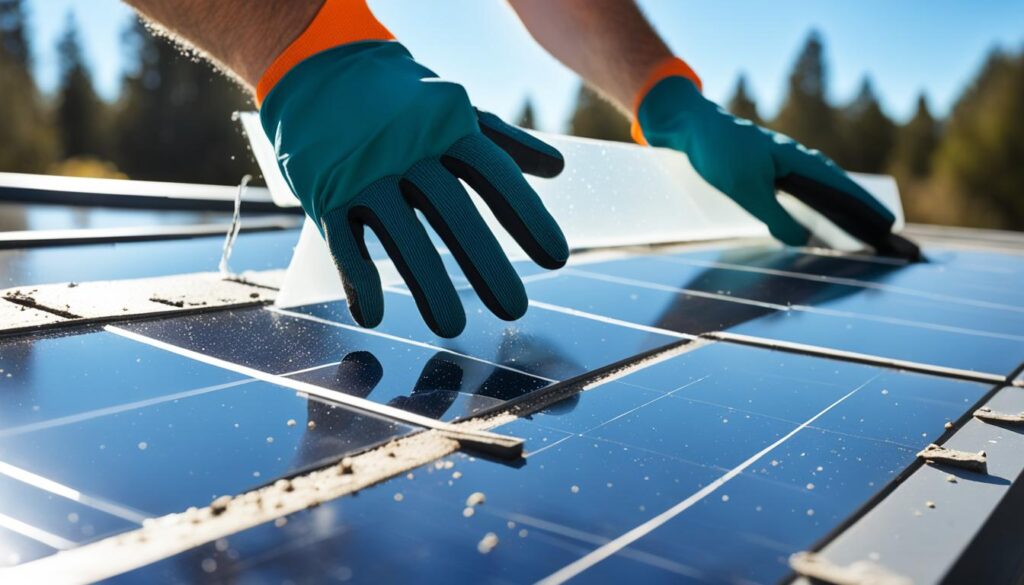Solar Panel Cleaning: Boost Your Energy Efficiency.
Solar panels provide a sustainable means of producing electricity and lowering energy costs, making it a great investment for both businesses and homeowners. To operate at their best, solar panels need to be properly maintained, just like any other device. Solar panel cleaning is one frequently disregarded component of solar panel maintenance.
We’ll explore the importance of cleaning solar panels, how it impacts energy efficiency, the best cleaning techniques, and advice on how to keep your solar panels in top condition in this extensive guide. Knowing how important solar panel cleaning is will help you get the most out of your solar energy system, whether you own a home or a company.
Is Solar Panel Cleaning Matter
The way solar panels function is by changing sunlight into electric energy. However, the panels’ performance can be decreased if dirt, dust, leaves, bird droppings, and other material build up on them. According to studies, unclean solar panels can lose as much as 20–30% of their efficiency, which translates into higher energy bills and a lower return on investment.
Some Reason to Clean Solar Panels
Improve Energy Output: Clean panels can produce more electricity since they can absorb more sunlight.
Increase Life expectancy: By preventing the accumulation of corrosive elements, routine cleaning helps your solar panels last longer.
Secure Your Investment: Purchasing solar panels is a big financial commitment. They will stay in top shape for many years if they are cleaned properly.
Follow Warranty Requirements: As a condition of their warranties, certain manufacturers demand routine cleaning. If you don’t, your warranty can be nullified.
If You Not Clean Solar Panel What Happen
Ignoring solar panel cleaning can result in a number of problems, such as:
Reduced Efficiency: Your energy savings are diminished when dirty panels generate less electricity.
Permanent Marks: Bird droppings and persistent filth can leave stains that are difficult to get rid of.
Material Damage: Surface scratches brought on by accumulated debris might impair functionality.
Factors That Needs For Cleaning Panels:
Cleaning frequency is determined by a number of factors, including:
Location: Dirt builds up more quickly on panels in windy or dusty environments.
Weather: Because rain can wash away debris, areas that receive a lot of rain may need less cleaning.
Surroundings: It could be necessary to clean panels near trees or in places where birds are active more frequently.
Right time to clean your solar
Panels for homes: every three to six months
Commercial Panels: Depending on usage and environmental factors, every one to three months
Saftey Time For Solar Cleaning
step1:Firstly, turn off the system.
To be safe, turn off the solar panel system before cleaning.
Step 2: Make Use of the Right Tools
A cloth or soft-bristle brush
Smooth cloth for cleaning
Hose featuring a mild spray nozzle
Solar panel cleaning solution or mild soap
Step 3: Clear Out Any Loose Material
Before adding water, gently brush away any loose debris, leaves, or bird droppings.
Step 4: Use water to wash
Clean water can be sprayed on the panels to get rid of surface grime. Steer clear of high-pressure water since it may harm the panels.
Step 5: Use the Cleaning Agent
To clean the panels, use a soft cloth or sponge and a solution of mild soap and water. Steer clear of harsh chemicals since they can harm the surface.
Step 6: Cleanse Completely
Use fresh water to rinse the panels in order to get rid of
Expert Solar Panel Cleaning Services
Although doing your own cleaning is an option, it may be more efficient to hire professionals, particularly for large or difficult-to-reach systems. Professionals can clean panels without causing harm since they have the necessary equipment and knowledge.
When choosing Specialists
- extensive commercial installations
- Panels mounted on steep or tall roofs
- Damage or dirt that are persistent
The price of hiring a cleaner
Depending on the size and location, professional solar panel cleaning in India usually costs between ₹10 and ₹25 per panel.
Advice on Keeping Solar Panels Clean
Examine On a regular basis At least once a month, look for dirt, debris, or damage on your panels.
Cutting Down Nearby Trees: Overhanging branches can produce more waste by dropping leaves and giving birds a place to hide.
Install bird obstacles: You can stop nesting and droppings on your panels by installing bird spikes or nets.
Employ Automated Cleaning Systems: For convenience, think about spending money on self-cleaning panels or robotic cleaners.
Typical Misconceptions Regarding Cleaning Solar Panels
“Solar panels are effectively cleaned by rain.”
Rain can wash away some dirt, but it frequently leaves water stains and doesn’t get rid of tough dirt like bird droppings.
“Solar Panels Don’t Need Maintenance”
Solar panels need little upkeep, but for best results, they must be cleaned on a regular basis.
“Cleaning panels can be costly.”
Even professional cleaning services are cost-effective when weighed against the energy savings they offer, and do-it-yourself cleaning is reasonably priced.

